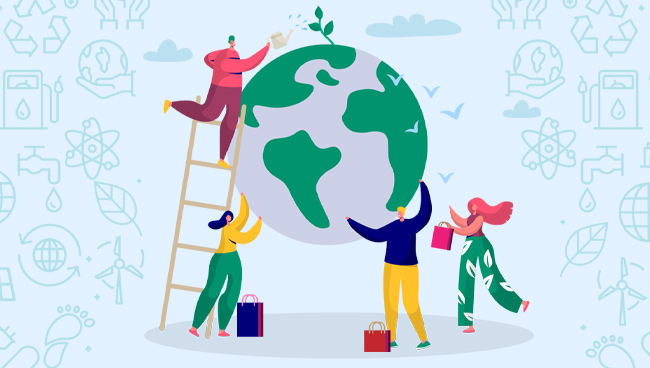In 2020, brands and retailers are shifting their focus to paying it forward, with missions that support responsible living, global preservation, inclusion and other practices that support positive change. But how do you prioritize what will make shoppers happy? WSL’s latest How America Shops® research delves into the new shopper values.
It’s 2020, Do You Know Where Your Values Are?
A quiet but massive movement is surfacing across retail and consumer brands in 2020. You can call it “Happy Earth, Happy Shopper,” and this movement will have a lasting change on shoppers’ decisions about what to buy and where.
More consumers, driven by the urge to spend responsibly, are consciously directing their dollars toward goods that promote well-being for themselves and for the earth, whether that is in the form of clean ingredients, sustainable practices, a calming experience or a deep sense of purpose.
According to our latest How America Shops® report, Change NOW, 60% of shoppers will pay more for products that are healthier or free from harmful ingredients.
As a result, businesses with a conscience will unseat retail’s status quo in 2020.
More retailers are embracing “soft” values that align with happier, healthier communities, society and the planet. It’s manifesting in the forms of earth-friendly materials, treating workers and suppliers fairly and a new definition of fashion and beauty.
Let’s explore.
More Brands, Retailers Are Making Caring a Core Focus
Vogue magazine has written its first-ever mission statement that elevates its responsibility well beyond reporting on fashion. Vogue is advocating for independence, individuality, creativity, and insists on “inclusivity, respect, and collaboration.”
In short, Vogue will “Take a stand.”
Other consumer brands and retailers are doing just that:
- Women’s retail chain J. Jill’s Compassion Fund assists community-based organizations that offer development and educational programs that empower women.
- Toymaker Mattel has launched a new line of inclusive Barbie dolls, including a Barbie in a wheelchair.
- Low-priced grocery chain Aldi in 2019 pledged that 100% of its packaging, including plastics, will be reusable, recyclable or compostable by 2025. Other supermarket chains, including Kroger, have similar goals to reduce waste, stock sustainable seafood and partner with ethically responsible food suppliers.
- The AM Retail Group, operator of Wilsons Leather, Calvin Klein Performance, Karl Lagerfeld Paris, G.H. Bass & Co., and DKNY stores, in December 2019 agreed to ban fur.
- Clothing brand prAna uses recycled wool and organic cotton in its goods, which are fair trade-certified, in its bid to make “clothing for positive change.”
- Marriott International is phasing out mini bottles of toiletry items by December 2020.
- Levi’s Water<Less Jeans are made with up to 96% less water, saving 172 million liters of water to date. For context, one report estimates it can take more than 2,000 liters of water to produce enough cotton to make one pair of jeans.
- Clothing retailer Everlane shares its markup process for each garment, so shoppers understand what they are paying for, and it showcases its factories so customers know where items are sourced. It claims every factory gets audited and scored during the selection process.
- Lush Cosmetics has eliminated all packaging from its beauty products, from bath bombs to solid shampoo bars. It ships its products in biodegradable plastic bags and fillers.
- Sustain Natural, a maker of nontoxic, eco-friendly vegan tampons, condoms, and lubricants, uses all certified organic ingredients, including latex from a Fair Trade rubber tree plantation in India. Perhaps most important: Its condoms do not contain nitrosamines, a possible carcinogen found in many brands.
Conscious Consumerism is All About Wellness: 3 Tips
As more brands and retailers expose their conscience, shoppers will, in turn, become more discriminating and expect retailers to continue to deliver on the basics. Based on what our shoppers told us for our Change Now report, we suggest these three guidelines:
- Provide serenity now. More shoppers are pursuing activities that elevate calm. Nearly a third told us they spend more time decluttering their homes now than two or three years ago, and 43% are spending more time at home. Goods that support a sense of calm, in part by coming from sustainable sources, will likely be more appealing.
- Make browsing a pleasure. Because shoppers are spending more time at home, a larger share is browsing online – 91% compared with 84% in-store. In fact, online browsing is up 27 percentage points from a couple of years ago, while in-store browsing is on the decline. Still, a large percentage of consumers are in stores, so brands and retailers should find ways to deliver browsing with a purpose, such as pointing out sustainable brands and practices.
- Convenience beats price if it is easy to find. Convenience is a valuable currency, and it will pay for calmer moments. Half of shoppers told us they buy from stores that are more convenient, even if it means paying a higher price. These customers may respond well to apps that locate products and feature brands that support a better world and healthier shoppers.
The year 2020 is sizing up to kick off a decade of positive change for all, and retailers can play a crucial role. The key to doing it well is ensuring fundamental shopper preferences – convenience, ease and a sense of doing good – are met as well as the needs of a happier planet.


